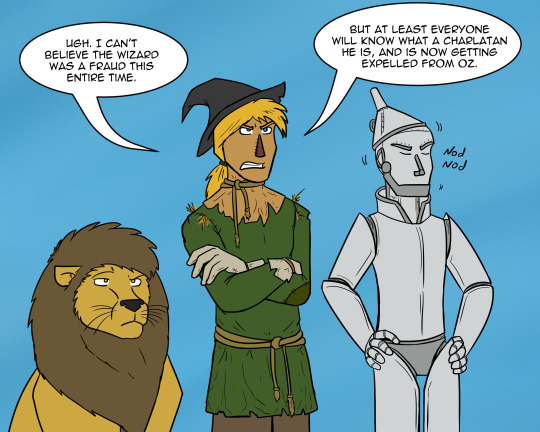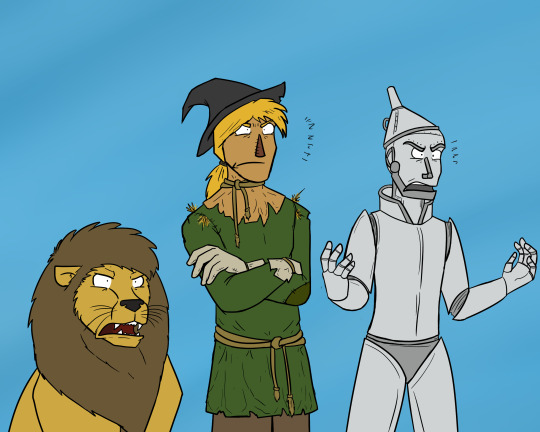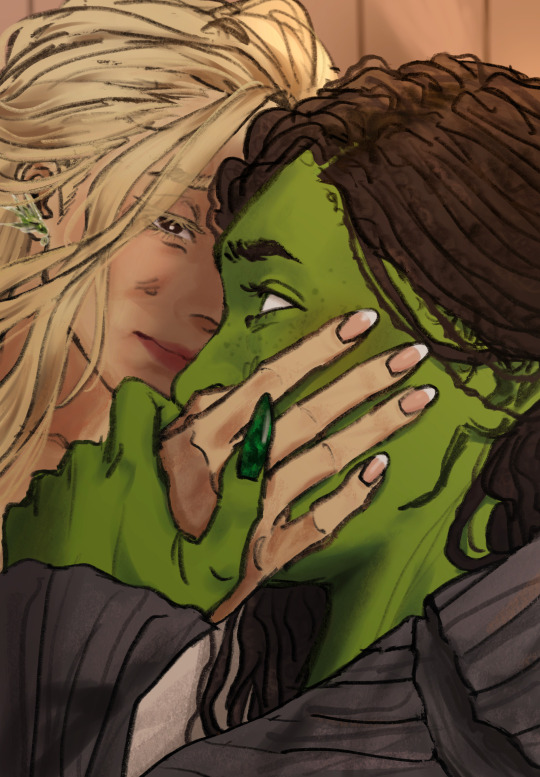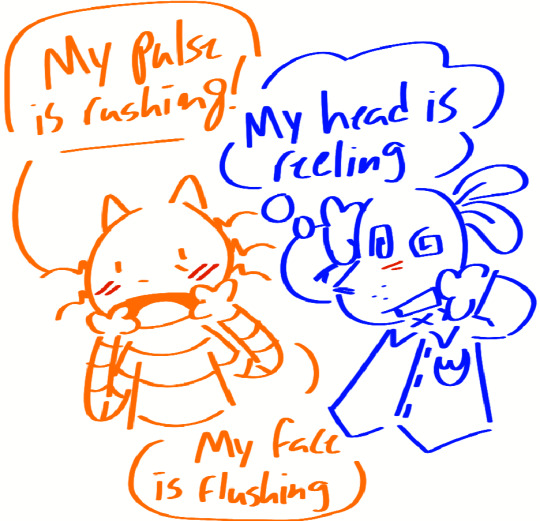#wicked references
Explore tagged Tumblr posts
Text
please watch this, in its entirety, up to the very end. no gifs will do it justice and I promise you won't regret it lol
youtube
#paul mescal#in stefon voice#this video has EVERYTHING#paul mescal singing while doing exaggerated fight choreography#also flossing for some reason#a mikey day/paul mescal rap battle#wicked references#seriously watch it lol#thcrin#this is right up your alley lol#theres no place like rooooooooooome#av
72 notes
·
View notes
Text

little ways to flirt and flounce
#wicked#wicked fanart#elphaba#glinda#gelphie#reference used#digital painting#myart#wlw#lesbian#gelphie fanart#gelphie art#posting gelphie fanart until I find a girlfriend
11K notes
·
View notes
Text
A Defense of Snow White’s Prince Florian
“He kissed a random corpse in the forest!”
“He’s preying on a child!”
“He stalked her!”
Please, please, you guys, I’m begging you to actually WATCH the original Snow White and the Seven Dwarfs.
WATCH.
THE.
MOVIE.
Because the Prince kissing Snow White is, to me, one of the most heartbreaking scenes in Disney history.
And here’s why.
First of all, the Prince is clearly close to Snow White’s age. He is both drawn and voiced as very youthful. He looks and sounds about 16 or 17, at the oldest. He is NOT a “predator”. He’s a boy who loves a girl, like in any good fairy tale.
Secondly, the Prince meets Snow White early in the movie. She’s NOT a complete stranger to him at the end. And their first meeting is significant. The Evil Queen makes a big deal out of Snow White’s looks, being “the fairest of all”, etc. But the Prince is first drawn to Snow White’s VOICE. He’s captivated by her singing and her kindness to the birds. He sees beyond her looks. He sees past the rags she wears and recognizes that this is a good person, a beautiful person on the inside. Then when she’s startled by him, he’s very polite and soft-spoken, apologizing for frightening her. He’s a total gentleman. Then he serenades her, letting her know how much he admires her. (Words that she has NEVER heard from ANYONE else in her life, by the way.) Then he even smiles at and is kissed by a dove that lands on his finger, hinting he has a connection with animals somewhat like hers.
And then there’s a fade to black. So we actually don’t know if she came out again, if they talked for a while. Maybe they didn’t, but maybe they did. The film doesn’t clearly tell us one way or another. But there is a possibility that they did get to know each other a little there. And if they didn’t, something is still beginning between them. They share warm smiles and affectionate looks. They both feel it, and they both hope to pursue it.
Then Snow White finds out her stepmom wants her dead and has to run away. Which means the Prince noticed her absence.
And the narrative text later tells us that he “searched far and wide” for her after she disappeared. (This guy walked so Fiyero could run, let’s be real.) Imagine the person you’ve been thinking about, hoping to get to know, wondering if they may be the one, suddenly vanished without a trace. And she’s the Princess of your neighboring kingdom. And then the Queen of the same kingdom also suddenly disappears. Wouldn’t you be alarmed? There’s a chance the huntsman may have gone to the Prince’s kingdom for help, and warned him of the Queen’s horrible actions. There��s also a chance that the Queen already had a bad reputation in the area, and the disappearances were a confirmation of what was already suspected. So the Prince nobly tries to find out what happened to his newfound love, worried about her safety. Snow White sings about her hope that she will see him again and tells the dwarfs about him … but the full truth of the situation is that he’s been thinking about her too. It’s a mutual young first love, pure and innocent.
Then the Prince FINALLY finds his beloved… in a coffin. After a “far and wide” search, there she is, apparently DEAD! All his hopes and wishes for a possible relationship with her are dashed. A 17-year-old who once dreamed of reuniting with his first love has just found her dead. He knows absolutely nothing about the poisoned apple’s spell or its cure. He doesn’t know a kiss will save her. He thinks she’s gone. Forever. All he knows is that he has found the girl he loves too late, and he couldn’t help her, despite all his searching. So, he kisses her goodbye. He kisses her as an apology, a sign of regret for lost dreams, a chance that he seems to have been denied. A 2-second touch of her lips to show his devotion. Then he bows his head and grieves.
This moment demonstrates than in him, Snow White has found the genuine love she’s been yearning for. While her stepmother tried multiple times to murder her, now she has someone who genuinely values her, so much so that he searched everywhere to find her when she went missing. Who was so heartbroken and crushed at the notion that she was gone forever that he gave her what he thought was a goodbye kiss, his one and only way of showing what she meant to him before he became haunted by the ghost of her memory, of his failure, of his lost chance at love.
This is a deeply and tragically romantic moment that has sadly been widely misunderstood. Do not slander Prince Florian! He doesn’t deserve it!
#disney#disney princesses#disney prince#prince florian#snow white#snow white 1937#snow white and the seven dwarfs#snow white and the 7 dwarfs#disney fandom#disney meta#disney movies#disney films#disney snow white#walt disney#disney analysis#evil queen#seven dwarfs#the one that started it all#poisoned apple#wicked reference#snow white disney
1K notes
·
View notes
Text




A funny idea of what would happen if, after even being revealed as a liar, a fraud, a con-artist, and just generally pathetic whelp of a human being, if the Wizard wasn't immediately ousted from his role as ruler of Oz and instead was chosen to lead despite his glaring inadequacies.
But good thing that's fantasy and just make-believe and wouldn't happen in real life! (:
There is no political implication at all in this comic (:
I'm doing great, why do you ask.
#wizard of oz#oz#the wizard of oz#tin man#lion#cowardly lion#tin woodsman#wicked#ichi draws#i promise the last panel is a funny reference to the movie and nothing more#scarecrow#wicked the musical
3K notes
·
View notes
Text

reprise
#wicked#galinda upland#elphaba thropp#gelphie#i think it would be really cute if galinda had hand tattoos like ariana grande specifically so that i could have drawn them here#og iysure followers will remember that i've been holding onto this reference since 2022 when i tried and failed to draw rhaenicent
755 notes
·
View notes
Text


THE WIZARD OF OZ (1939) | WICKED: FOR GOOD (2025)
#wicked#wicked for good#the wizard of oz#gif#gifs#comparison#references#ariana grande#cynthia erivo#ariana grande gifs#cynthia erivo gifs
555 notes
·
View notes
Note
Papa remmick oh lord my heart…more hcs with an older daughter maybe??? Like tween-teen age
ᴘᴀᴘᴀ!ʀᴇᴍᴍɪᴄᴋ ʜᴇᴀᴅᴄᴀɴᴏɴꜱ ᴘᴛ. 2
ᴀ/ɴ: PART 2 OF MY 3-PART PAPA!REMMICK SERIES WOOHOO (part 1 here)! I love writing headcanons so please don't stop requesting them y'all, whether they're more of this or something else. I don't have many more ideas in the tank but I'm gonna work my ass off on that third part!
ᴡᴀʀɴɪɴɢꜱ: Just more of the most sickly sweet papa!remmick headcanons, tween edition! Minor exploration of hybrid physiology too, but nothing crazy.

she, just like everybody else, can not get a lie past this man. ʀᴇᴍᴍɪᴄᴋ can literally hear heartbeats, so he'll simply listen to her make up a whole story to explain something and once she's done he'll simply say:
“ya wanna try it again with the truth this time?”
ʀᴇᴍᴍɪᴄᴋ was patient zero of the sassy man apocalypse. don't let her try to backtalk him cause he will shut it down with EASE.
speaking of, if she ever says “you just don’t get it, papa,” ʀᴇᴍᴍɪᴄᴋ will turn around and unload a millennium's worth of “getting it”. after the first few times of an hour long lecture, she just stopped saying it. yapper ass 😭.
ʀᴇᴍᴍɪᴄᴋ still does her hair every sunday morning. she groans about it now, tells him it takes too long and all that jazz. but she never once asks him to stop, and he still ends it with three kisses and compliments galore.
ʀᴇᴍᴍɪᴄᴋ takes every single one of her tweenhood rants very seriously. plot holes in her favorite book? he's nodding along. complaints about homework? arms folded and agreeing with every critique. she's wrong more than half the time, but he just loves hearing her talk.
ʀᴇᴍᴍɪᴄᴋ is THAT parent who checks to see if she's sleeping multiple times a night. he's literally the warioware mom but if the game was entirely rigged and not winnable.
“mmhmm. i see them eyes movin’. hand me the book, baby.” “i was just-” “you was just stallin’. now gimme. ain’t no story better than sleep.”
ʀᴇᴍᴍɪᴄᴋ still sings to her, and now she sings back. she's way better, but he'll never admit it. they've been getting really into this one irish jig recently...
when she gets a compliment, she always turns to ʀᴇᴍᴍɪᴄᴋ first.
“they said my dress was pretty!” “i told you it was. papa always knows.”
ʀᴇᴍᴍɪᴄᴋ keeps a running mental list of the little things she likes. favorites snacks, books, clothes, colors. updates it daily, and he will turn the house upside down if her preferences change.
ʀᴇᴍᴍɪᴄᴋ wakes her up soft, always. even when they're in a rush, he will never wake her up with anything but a kiss to the forehead and a gravely “mornin’, baby girl.”
ʀᴇᴍᴍɪᴄᴋ starts planning for her birthday at least six months in advance. theme ideas, guest lists, menus, gifts, he's got everything in a secret folder. and when the big day comes, the whole house transforms overnight. do not come out of your room while he's preparing though because his ass will be looking like a madman.
ʀᴇᴍᴍɪᴄᴋ spoils his daughter constantly. new shoes? hers. favorite dessert? made fresh. saw something cute in the window a week ago? already wrapped and waiting. but she never expects it and always, ALWAYS, thanks him and gives him the biggest hug. he gets real close to crying every single time. HE'S A SENTIMENTAL MAN OKAY?!
“thank you, papa,” “you’re welcome, baby. i’d give you the world if i could.”
speaking of sentimental, ʀᴇᴍᴍɪᴄᴋ's the type of dad who says “my girl’s growing up” EVERY OTHER DAY. she could drink a glass of water and he'll start with his misty-eyed reminiscing about how he used to hold her in his arms. it always makes her giggle.
she sleeps exactly like him. dead silent, barely breathing, sprawled in weird poses. ʀᴇᴍᴍɪᴄᴋ thinks its adorable.
when her fangs started to come in, ʀᴇᴍᴍɪᴄᴋ lost his mind. walked around the house beaming and asked her to smile a million times that day. he still gets a kick out of it.
“that’s my girl, look at them teeth! ain’t she perfect?”
ʀᴇᴍᴍɪᴄᴋ's explanation for why his reflection is always funny in the mirror has stayed the same for years.
“papa’s just shy.”
ʀᴇᴍᴍɪᴄᴋ's teaching her gaelic. he just is. in his eyes, she's going to revive the “dead” language.
they have a million inside jokes between each other. they'll say the most random shit and have each other in stitches, and nobody else will ever get it.
ʀᴇᴍᴍɪᴄᴋ does not play about school picture day. her clothes are ironed out the night before, her hair is always done, and he walks her to school personally while plucking out every speck of dust that dares to threaten his baby's look. and yes, he has every school picture framed in chronological order.
the one and only time she called herself ugly, ʀᴇᴍᴍɪᴄᴋ sat her down, looked her dead in the eyes and said:
“don’t you ever lie like that again, baby. you’re the sun. you hear me? the sun.”
ʀᴇᴍᴍɪᴄᴋ makes her lunch every single day, and best believe there's a handwritten note in perfect cursive tucked inside, with a doodle on the back. each one is unique and incredibly heartfelt. sometimes, she’ll write a note back.
and every night, guess where ʀᴇᴍᴍɪᴄᴋ is? kneeling at her bed and asking the same question he's asked since she was still in his arms.
“ya know who loves ya?” “you do, papa.” “damn right i do.” same as always. hand over heart. eyes full of stars.
#i def went overboard#i kinda zoned out BYEEEE#loved writing this though#holding space for the wicked reference#remmick x reader#remmick#black!fem!reader#black!reader#remmick x black!reader#sinners#remmick sinners#remmick x you#headcanon#headcanons#remmick headcanons#remmick x black!fem!reader#remmick fluff#sinners 2025#sinners movie
502 notes
·
View notes
Text

What a slippery tongue—I mean, slip of the tongue!
484 notes
·
View notes
Text

Silly fruits ~
#fooze#pride#wicked#wicked fanart#wicked the movie#wicked the musical#glinda upland#glinda the good witch#elphaba thropp#gelphie#I wanted to post a piece again this year but between work and being in an art rut it just wasn’t working out :(#last minute but it’s fine it’s fine#spot the reference
371 notes
·
View notes
Text

As long as you‘re mine
#myart#digital painting#wicked#elphaba#glinda#gelphie#gelphie fanart#reference used#posting gelphie fanart until i find a girlfriend
3K notes
·
View notes
Text
Elphaba: You’re shirtless? Fiyero: nods Elphaba: And covered in… oil? Fiyero: Well you know how you always say I never glisten? Elphaba: Listen. You never listen. Fiyero: Oh.
#this is also a sneaky reference to the book for those who know👀#overheard at shiz#wicked#wicked 2024#wicked the musical#wicked movie#elphaba thropp#fiyero tigelaar#fiyeraba#elphaba x fiyero#fiyero x elphaba#cynthia erivo#jonathan bailey#wicked elphaba#elphaba#fiyero#wicked fiyero#Elphaba x fiyero#Fiyero x elphaba
1K notes
·
View notes
Text


(feverish voice) happy day of devotion
#disclaimer i only read the paralogues like 8/10 of the way into this i completely forgot they existed ksdjfhkdjf#i had the bulk of it done last week but didn't have time to work on it and then i got the flu yesterday 💀#shoehorned in references: lifted the hat line wholesale from wicked for Reasons. and hubert tuxedo masking away#fire emblem three houses#fe3h#fire emblem heroes#ferdibert#hubert von vestra#ferdinand von aegir#ok goodnight
498 notes
·
View notes
Text






#dogman#dogman lil petey#dogman petey#dogman x petey#detey#dogman grampa#idk his name#wicked reference#sonic reference#i have art block#i apologize for the quality#idk what else to tag
1K notes
·
View notes
Text


i fear i am feeling the gelphie and wicked hype just like everyone else…! also i enjoy these outfits… #lines
#if u get the reference being made in the 2nd sketch with the note…. shhh#so hard getting good outfit references for them…..#wicked#wicked the movie#glinda upland#elphaba thropp#wicked glinda#wicked elphaba#gelphie#glinda x elphaba#fanart#coloured sketch
728 notes
·
View notes
Text


lan wangji is in his commitment era 💚💙
(or, nie huaisang: an emotional journey)
happy bday lwj good luck w all ur endeavors! 🥳
the series tag: ★ | wallpapers: 1 | 2 | 3 | printable: 1 | 2 | 3 | 4 | 5 | 6 | snowglobe
#nie huaisang#lan wangji#wangxian#mdzs#mo dao zu shi#mdzs modern au#(art)#(fanart)#(january2024)#yes this is a Wicked the Musical reference#surprisingly.... lwj is glinda
2K notes
·
View notes
Text

Fiyero Tattoo Map
Wayyyy back in the day when I just got into the Wicked fandom, I borrowed the detail from the book that Fiyero had blue diamond tattoos. Because as a tattoo-haver myself, I think tattoos are cool. Unfortunately, the tattoo design in the book is . . . bad, so I took some creative liberties and drew him with diamonds in specific places on his body to represent different things (the tattoos on his forehead resembling a crown to symbolize his royal blood, sword on right arm to represent his achievement as Captain of the Guards, etc)
And when my love for Wicked was revitalized and I began pumping out comics like crazy, I decided to not draw him with tattoos because I worried I would confuse a lot of newcomers. They would see him and not know who he was supposed to be, as they would only know Fiyero from the trailers featuring Johnathan Bailey and already my own Fiyero is far and away removed from that design/appearance.
But, the tattoos play a pretty important part in my planned fanfics and rewrites, so I decided to just go for it and start drawing him with tattoos again. And, with any redesign, his tattoos would also need a major overhaul. Which is what I chose to do here!
So to make a long rambling mess short, check out his sick tats, yo. I have to thank an art buddy on a Discord server of mine who really helped me make a good cohesive design for him, as I don't really know much about designing things like this! You were a great help so thank you!
#fiyero#fiyero tiggular#fiyero tigelaar#wicked#wicked musical#wicked the life and times of the wicked witch of the west#wizard of oz#oz#ichi draws#this is mostly a reference for myself#and now watch me never draw him shirtless ever
444 notes
·
View notes